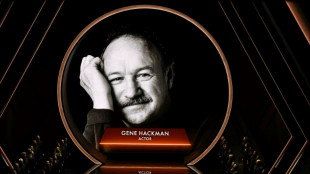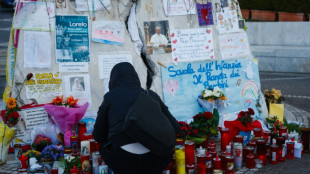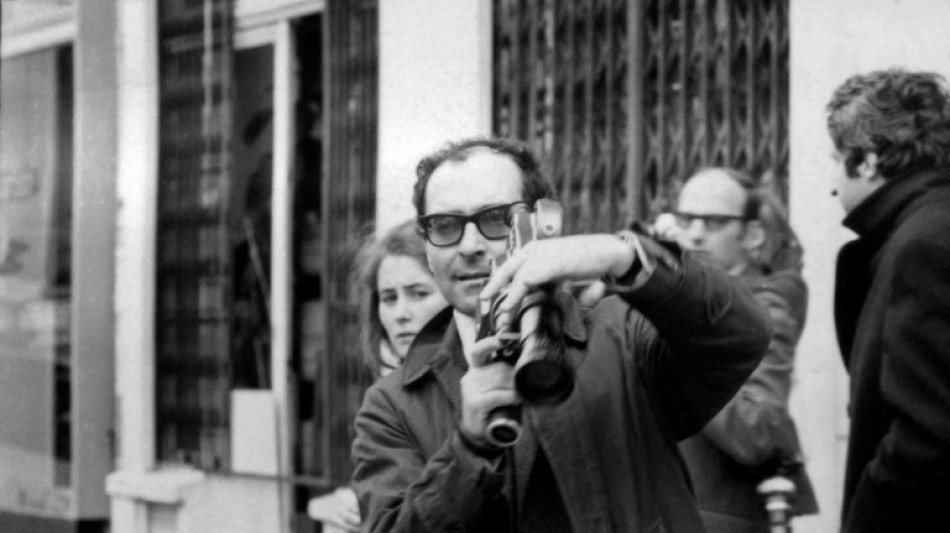
-
 Stock markets extend losses over US tariffs, recession fears
Stock markets extend losses over US tariffs, recession fears
-
Trump doubles down on Canada trade war with major tariff hike

-
 UK makes manslaughter arrest over North Sea ship crash
UK makes manslaughter arrest over North Sea ship crash
-
Ghana scraps IMF-linked 'nuisance' taxes

-
 Trump doubles down on Canada trade war with massive new tariffs
Trump doubles down on Canada trade war with massive new tariffs
-
French right-wing media's Russia tilt irks Elysee

-
 Stock markets waver after sell-off over US recession fears
Stock markets waver after sell-off over US recession fears
-
Volkswagen to navigate another tricky year after 2024 profit plunge

-
 Ships blaze after North Sea crash, govt rules out foul play
Ships blaze after North Sea crash, govt rules out foul play
-
Chanel plays with proportions as Paris Fashion Week wraps up
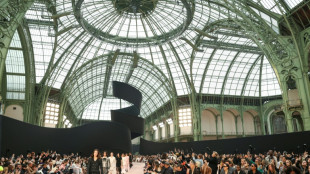
-
 Stock markets mixed as Trump-fuelled economy fears weigh
Stock markets mixed as Trump-fuelled economy fears weigh
-
Ships blaze, spill feared after North Sea crash

-
 Volkswagen profits hit as high costs, China woes weigh
Volkswagen profits hit as high costs, China woes weigh
-
Struggling Japanese automaker Nissan replaces CEO

-
 Ships still on fire after North Sea crash
Ships still on fire after North Sea crash
-
Lego posts record profit, CEO shrugs off US tariff threat

-
 Most markets in retreat as Trump-fuelled economy fears build
Most markets in retreat as Trump-fuelled economy fears build
-
Asian markets track Wall St lower as Trump-fuelled economy fears build

-
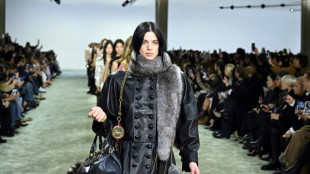 From 'mob wives' to millennials: Faux fur is now a fashion staple
From 'mob wives' to millennials: Faux fur is now a fashion staple
-
South Korea's Kia denies responsibility for anti-Musk ad

-
 Kung fu girl group puts fresh spin on ancient Chinese art
Kung fu girl group puts fresh spin on ancient Chinese art
-
Asian markets track Wall St selloff as Trump-fuelled economy fears build

-
 Indian artisans keep traditional toymaking alive
Indian artisans keep traditional toymaking alive
-
Bear Robotics' Carti 100 Wins iF DESIGN AWARD 2025, Setting New Standards in Logistics Automation

-
 Formerra Introduces Formerra+ Upgraded Ecommerce Site to Optimize Customer Experience
Formerra Introduces Formerra+ Upgraded Ecommerce Site to Optimize Customer Experience
-
Search ends for missing crew member after North Sea collision

-
 One missing after cargo ship, tanker collide in North Sea
One missing after cargo ship, tanker collide in North Sea
-
Stock markets slump on US recession fears

-
 'Elbows up!' - the hockey tactic inspiring Canada's anti-Trump fight
'Elbows up!' - the hockey tactic inspiring Canada's anti-Trump fight
-
Argentina searches for baby, young sister swept away by floods
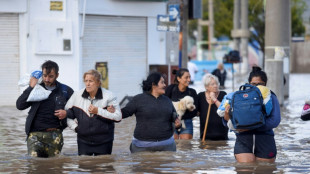
-
 Stock markets slump on US economic fears
Stock markets slump on US economic fears
-
UN chief says 'poison of patriarchy' is back with a vengeance

-
 UBS fined 75,000 euros in France for harassing two whistleblowers
UBS fined 75,000 euros in France for harassing two whistleblowers
-
Stock markets slump on US, China economic fears

-
 Major fuel shortage hits black gold producer Niger
Major fuel shortage hits black gold producer Niger
-
Musk spat renews opposition in Italy to Starlink deal

-
 Stock markets mainly lower on China, US economy fears
Stock markets mainly lower on China, US economy fears
-
Former Ubisoft bosses on trial in France over alleged harassment

-
 Strike action grounds thousands of flights in Germany
Strike action grounds thousands of flights in Germany
-
Trump says US in talks with four groups over TikTok sale

-
 Hong Kong, Shanghai lead losers on mixed day for markets
Hong Kong, Shanghai lead losers on mixed day for markets
-
'Got cash?' Tunisians grapple with new restrictions on cheques

-
 Russian disinformation 'infects' AI chatbots, researchers warn
Russian disinformation 'infects' AI chatbots, researchers warn
-
'Quite sad': Renters turn to lottery in Spain's housing crisis

-
 Indonesians seek escape as anger rises over quality of life
Indonesians seek escape as anger rises over quality of life
-
Iran says won't negotiate under 'intimidation' as Trump ramps up pressure

-
 7-Eleven, Couche-Tard explore sell-offs ahead of potential merger
7-Eleven, Couche-Tard explore sell-offs ahead of potential merger
-
Trump admin detains pro-Palestinian campus protest leader

-
 Japan auctions emergency rice reserves as prices soar
Japan auctions emergency rice reserves as prices soar
-
Hong Kong, Shanghai lead losers on mixed day for Asian markets

| RBGPF | 4.79% | 69.77 | $ | |
| RYCEF | 1.55% | 9.65 | $ | |
| CMSC | -0.26% | 22.92 | $ | |
| AZN | -2.1% | 74.43 | $ | |
| GSK | -2.17% | 39.465 | $ | |
| BTI | 0.48% | 40.755 | $ | |
| RELX | -0.19% | 47.23 | $ | |
| RIO | -0.76% | 61.74 | $ | |
| BP | -1.4% | 31.765 | $ | |
| NGG | -0.18% | 62.03 | $ | |
| CMSD | -0.67% | 23.06 | $ | |
| VOD | -3.22% | 9.155 | $ | |
| BCC | -1.32% | 97.88 | $ | |
| SCS | -2% | 11.275 | $ | |
| BCE | -2.69% | 24.52 | $ | |
| JRI | 0% | 12.89 | $ |

Godard, film rebel without a pause
Jean-Luc Godard -- who has died at 91 -- was the rebel spirit who drove the French New Wave, firing out a volley of films in the 1960s that rewrote the rules of cinema.
Between "Breathless" ("A Bout de Souffle") in 1960 and the student protests of 1968, Godard exhilarated audiences as he shook the film world with his technical innovations and savage, occasionally lyrical, satires.
Sometimes working on two movies at the same time, he ranged over crime, politics and prostitution in a burst of creative energy that would inspire two generations of directors.
Godard's witty aphorisms like "a story should have a beginning, a middle and an end -- but not necessarily in that order", became lodestars for filmmakers from Robert Altman and Martin Scorsese to Quentin Tarantino and Paul Thomas Anderson.
But the flame that had burned so bright in the 1960s veered off into revolutionary politics and Maoist obscurantism in the 1970s, and he came to be seen almost as a tragicomic figure.
Godard spent several years experimenting with video before returning to commercial filmmaking -- of a kind -- in 1979.
- Modern prophet -
But the freshness was gone and critics accused him of becoming too elliptical, with some branding his early films misogynist.
Yet the increasingly reclusive Godard persevered down his singular path, before reinventing himself in his later years as a gnomic cigar-chomping prophet.
He shot his critically acclaimed "Film Socialisme" on board the Costa Concordia cruise ship in 2009, declaring that capitalism was heading for the rocks. When the ship ran aground three years later, it wasn't just his small band of disciples who treated him as a visionary.
Born in Paris into a well-to-do Franco-Swiss family on December 3, 1930, Godard was lucky enough to spend World War II at Nyons in neutral Switzerland, returning to the French capital in 1949 to study ethnology at the Sorbonne.
But his real education was in the little cinemas of the Latin Quarter where he first ran into Francois Truffaut, Jacques Rivette and Eric Rohmer, all future luminaries of the French cinema.
He fell in love with American action cinema and began writing criticism under the pseudonym "Hans Lucas" with Truffaut, Rivette and Rohmer for small magazines like the "Cahiers du Cinema", where they plotted to revolutionise the art.
After a failed attempt to make his first film in America, he went to work on a dam in Switzerland and saved enough money to make a film about it, "Operation Concrete" (1954).
It helped lay the foundation for his rapid ascent that would see him hailed as the leader of the French New Wave when "Breathless" was released in 1960.
- 'The Picasso of cinema' -
That swaggering story of a small-time crook on the run who romances a young American in Paris was a major landmark in French cinema, heralding the arrival of a generation of irreverent young film-makers determined to break with the past.
So big was its impact that Truffaut called Godard cinema's Picasso, someone who had "sown chaos... and made everything possible". As often with Godard, their friendship later turned sour, with Truffaut branding him a "shit" after the pair fell out in 1973.
By shooting on the fly in outdoor locations and improvising endlessly, Godard rewrote the rulebook and helped popularise the idea of the director as "auteur", the creative force behind everything on the screen.
"Breathless" also gave the first big break to Jean-Paul Belmondo, who would later star in Godard's masterpiece and most personal film "Pierrot le Fou" (1965), which explored the pain of his break-up with the Danish actress Anna Karina.
From the start, Godard's career was dogged by controversy. "Le Petit Soldat" (1960), with its references to the Algerian war, was banned by the French authorities for three years and "Une Femme Mariee" (A married woman, 1964) had its title changed from "La Femme Mariee" by censors concerned that its adulterous heroine might be taken for the typical French wife.
But after "Weekend" (1967), a gory examination of the obsession with cars scattered with surrealistic traffic accidents, his work too often appeared self-indulgent.
Indeed, Godard became something of an intellectual oddity, emerging every few years from his bolthole in Rolle on the shores of Lake Geneva to lob a verbal grenade or two.
It was this tragic, cartoonish Godard on the slide who features in "Godard Mon Amour", the 2017 comedy about him by Michel Hazanavicius, the Oscar-winning maker of "The Artist".
But by then Godard was having the last laugh, with his reputation somewhat restored by a series of low-budget metaphorical films that questioned our image-saturated world.
"Film is over," he told The Guardian in a rare interview in 2011, recanting his oft-quoted maxim that "photography is truth, and the cinema is truth 24 times per second".
"With mobile phones, everyone is now an auteur," he said.
P.Gonzales--CPN

